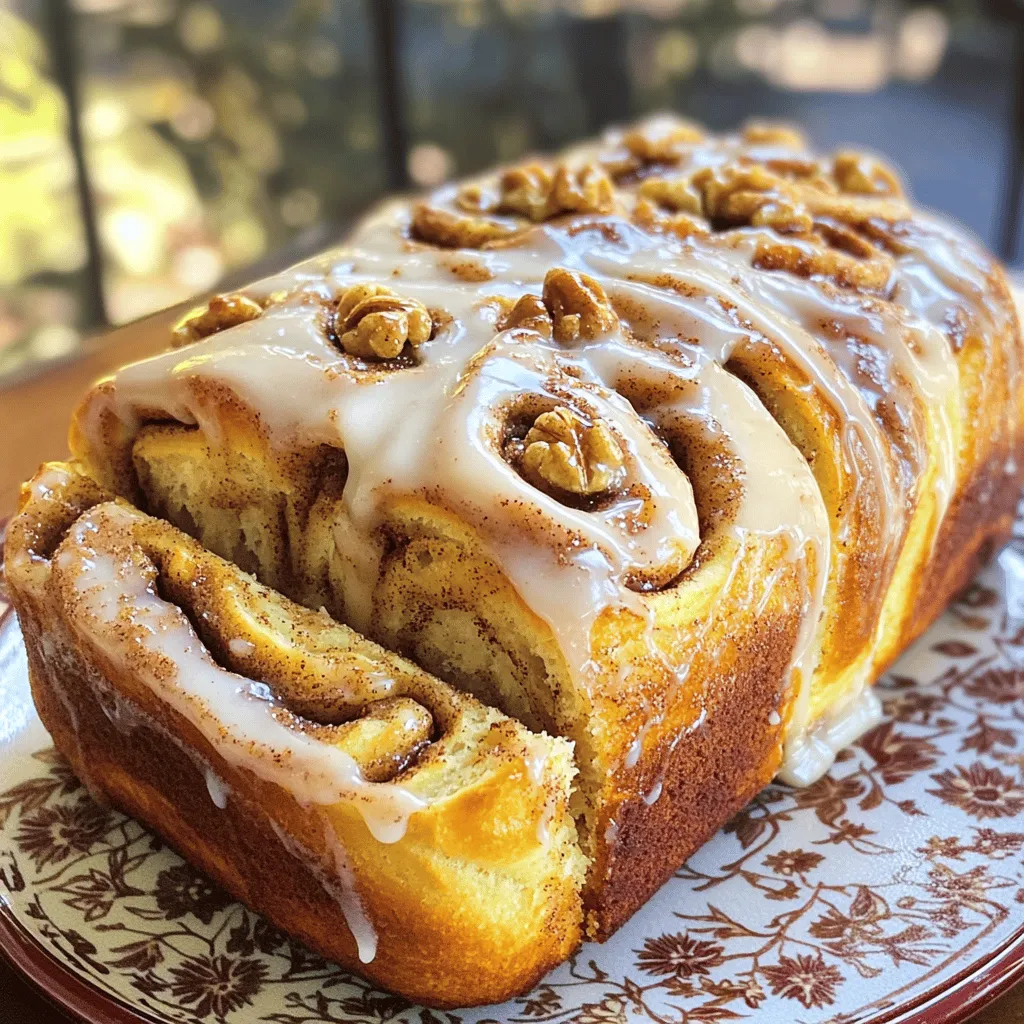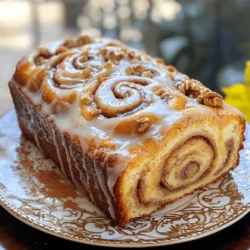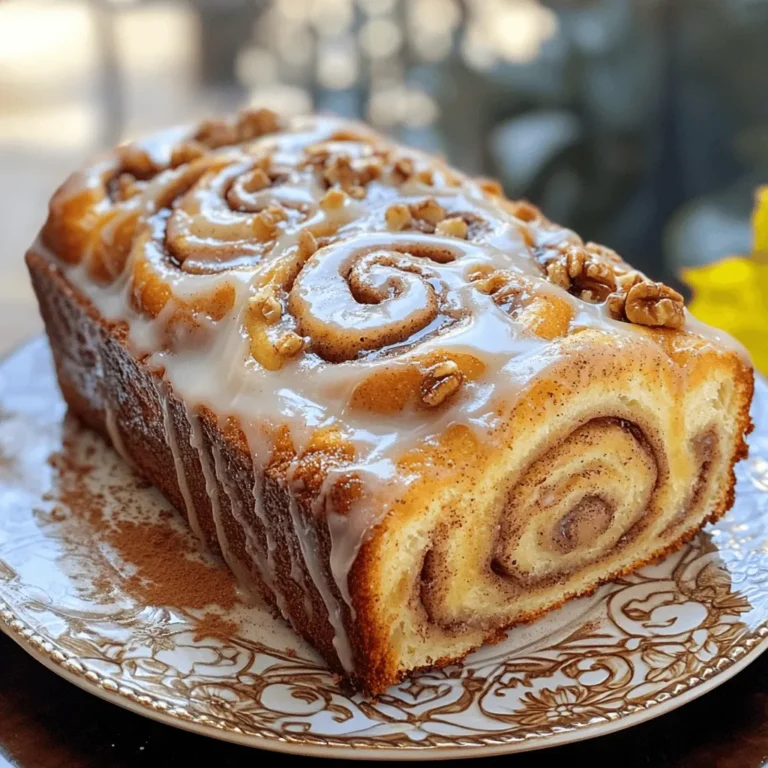Get ready to treat yourself to a slice of heaven with my Cinnamon Roll Loaf! In this post, I’ll share a simple recipe that blends the warm, cozy flavors of cinnamon rolls into a delightful loaf. From the perfect dough to tips for storage, I’ve got you covered. Whether you’re a baking pro or a beginner, this recipe will bring sweet joy to your kitchen. Let’s dive in and make something irresistible!
Ingredients
List of Ingredients
To make a delicious Cinnamon Roll Loaf, gather these ingredients:
– 3 cups all-purpose flour
– 1 packet (2 ¼ tsp) active dry yeast
– ½ cup warm milk (110°F/43°C)
– ¼ cup unsalted butter, melted
– ¼ cup granulated sugar
– 1 teaspoon salt
– 1 large egg
– 1 tablespoon ground cinnamon
– ½ cup brown sugar, packed
– ½ cup walnuts, chopped (optional)
– 1 teaspoon vanilla extract
– 1 cup powdered sugar (for icing)
– 2 tablespoons milk (for icing)
Ingredient Substitutions
You can easily swap some ingredients to suit your taste or diet:
– Use almond milk instead of regular milk for a dairy-free loaf.
– Replace all-purpose flour with whole wheat flour for a heartier option.
– If you want a nut-free version, skip the walnuts entirely.
– Maple syrup can replace granulated sugar for a unique flavor.
– Use cream cheese instead of powdered sugar for the icing for a richer taste.
Essential Tools and Equipment
To make this loaf, you will need a few key tools:
– Mixing bowls for combining ingredients.
– A wooden spoon or spatula for mixing the dough.
– A rolling pin for rolling out the dough.
– A loaf pan to shape and bake the loaf.
– A clean kitchen towel to cover the dough while it rises.
– A wire rack for cooling the loaf after baking.
– A whisk or fork for mixing the icing.
With these ingredients and tools, you are ready to create a lovely Cinnamon Roll Loaf that will impress everyone. Enjoy the process and the tasty results!
Step-by-Step Instructions
Preparation of Yeast Mixture
Start by getting a small bowl. Add warm milk, sugar, and yeast. Mix gently and let it sit for 5 to 10 minutes. You want it to get frothy. This means the yeast is alive and ready to work. If it does not foam, your yeast may be old.
Mixing the Dough
Next, grab a mixing bowl. Combine 2 cups of flour and salt. Make a well in the center. Pour in the frothy yeast mix, melted butter, egg, and vanilla extract. Mix it all together. Gradually add the rest of the flour until the dough forms a ball.
Kneading Techniques
Now, it’s time to knead. Place the dough on a floured surface. Knead for about 5 to 7 minutes. You want it to be smooth and elastic. If it sticks to your hands, sprinkle a little more flour. This helps the dough become soft and easy to work with.
Rolling and Filling the Dough
Once kneaded, punch down the dough. Roll it out on a floured surface into a rectangle. Aim for about ½ inch thick. In a small bowl, mix brown sugar, cinnamon, and walnuts if you choose to use them. Spread this mixture evenly over the rolled dough.
Shaping and Second Rise
After spreading the filling, roll the dough tightly from the long edge. Pinch the seams to seal it well. Place the log in a greased loaf pan, cut side up. Cover it with a towel and let it rise for another 30 minutes.
Baking Process
Preheat your oven to 350°F (175°C) while the dough rises. Bake the loaf for 30 to 35 minutes. Look for a golden brown color. The loaf should smell amazing! Let it cool in the pan for about 10 minutes. Move it to a wire rack to cool completely.
Now, your cinnamon roll loaf is ready to slice and enjoy!
Tips & Tricks
How to Achieve the Perfect Texture
To get that soft and fluffy texture, knead the dough well. Knead for about 5-7 minutes until smooth. This step helps build gluten, giving the loaf structure. Let the dough rise in a warm spot. This makes it light and airy.
Common Baking Mistakes to Avoid
One common mistake is not letting the dough rise enough. Always wait until it doubles in size. Another mistake is using cold milk. Warm milk activates the yeast better. Lastly, avoid opening the oven door too soon. This lets out heat and can make the loaf dense.
Cooling and Icing Tips
Let the loaf cool in the pan for about 10 minutes. This prevents it from getting soggy. After cooling, move it to a wire rack. For the icing, mix powdered sugar with milk until smooth. Drizzle the icing over the cooled loaf for a sweet finish.

Variations
Flavor Add-Ins (Chocolate, Dried Fruits)
You can make this loaf even more fun! Add chocolate chips or dried fruits to the filling. Chopped chocolate adds rich flavor. Dried fruits like raisins or cranberries bring a sweet twist. Mix them into the brown sugar and cinnamon filling. This simple change adds a burst of flavor in every bite.
Adjusting Sweetness Levels
If you want a sweeter loaf, add more sugar to the filling. You can also use less sugar if you prefer a less sweet treat. This recipe is flexible. Taste the filling before rolling it up. You can always adjust it to match your taste.
Gluten-Free & Dairy-Free Options
To make a gluten-free version, swap the all-purpose flour for a gluten-free blend. Make sure the blend has xantham gum for the right texture. For a dairy-free loaf, use almond milk or coconut milk instead of regular milk. Also, replace butter with coconut oil. These swaps keep the loaf delicious without dairy or gluten.
Storage Info
Best Ways to Store Cinnamon Roll Loaf
To keep your cinnamon roll loaf fresh, wrap it tightly in plastic wrap. You can also use aluminum foil. This keeps air out and helps the loaf stay soft. Store it at room temperature for up to three days. If you plan to keep it longer, consider freezing it.
Freezing Instructions
To freeze the loaf, let it cool completely first. Once cooled, wrap it well in plastic wrap. Then, place it in a freezer bag or airtight container. This helps prevent freezer burn. You can freeze the loaf for up to three months. Label the bag with the date so you remember when it was frozen.
How to Reheat for Freshness
When you want to enjoy your cinnamon roll loaf, take it out of the freezer. Let it thaw in the fridge overnight. For a warm slice, preheat your oven to 350°F (175°C). Place the loaf in the oven for about 10-15 minutes. This warms it up and revives the soft texture. If you want, you can also microwave a slice for about 15-20 seconds. Drizzle with icing after reheating for a delightful treat!
FAQs
What is a Cinnamon Roll Loaf?
A cinnamon roll loaf is a sweet bread that combines the warm flavors of cinnamon, sugar, and butter in a loaf shape. This treat is soft and fluffy, with a sweet, gooey filling. When baked, it has a golden crust and a delightful aroma that fills the kitchen. People love to enjoy it fresh or toasted, often with a drizzle of icing on top.
Can I make this recipe in advance?
Yes, you can make the cinnamon roll loaf in advance. Prepare the dough, let it rise, and shape it into a loaf. Then, cover it and place it in the fridge overnight. The next day, allow it to rise at room temperature for about 30 minutes before baking. This method saves time and gives you fresh bread with little effort.
How do I know when the loaf is done baking?
To check if the loaf is done, look for a golden-brown crust. You can also tap the bottom of the loaf; it should sound hollow. The internal temperature should be around 190°F (88°C). If you follow these tips, you will get a perfect loaf every time.
What can I use instead of walnuts?
If you do not want to use walnuts, there are many options. You can use pecans, almonds, or even leave them out entirely. For a nut-free version, consider adding raisins, chocolate chips, or even dried fruit. These additions will still give your loaf a great flavor.
How do I prevent the loaf from being too dense?
To keep your loaf light and fluffy, make sure the yeast is fresh and active. Allow the dough to rise fully before baking. Knead the dough well to develop gluten. Lastly, avoid adding too much flour while kneading. This will help create a soft, airy texture in your cinnamon roll loaf.
You learned about making a delicious cinnamon roll loaf. We covered the key ingredients, tools needed, and step-by-step baking instructions. I shared tips to get the right texture, avoid common mistakes, and how to store your loaf. You can also explore fun variations and address common questions.
As you try this recipe, remember that baking takes practice. Enjoy the process, and soon, you’ll be making perfect loaves to share. Happy baking!


